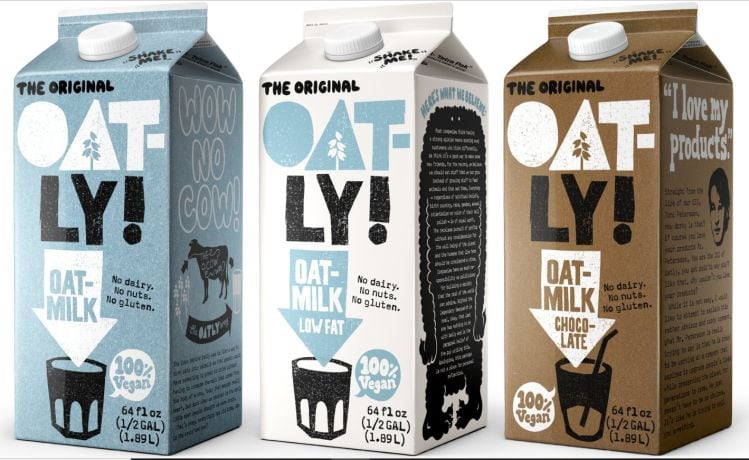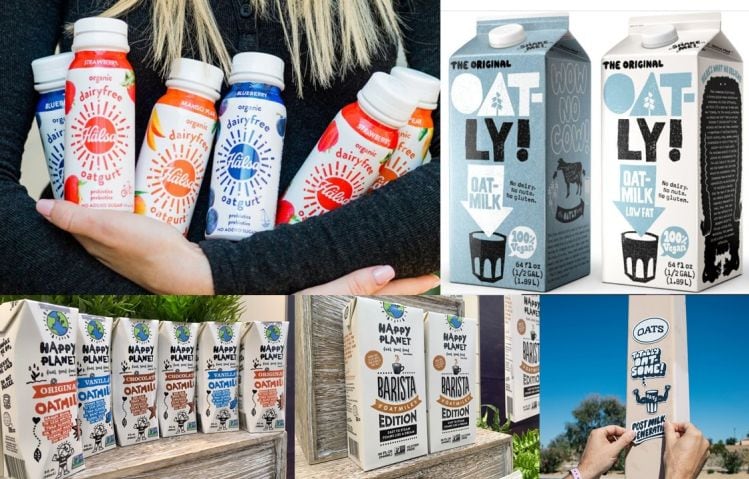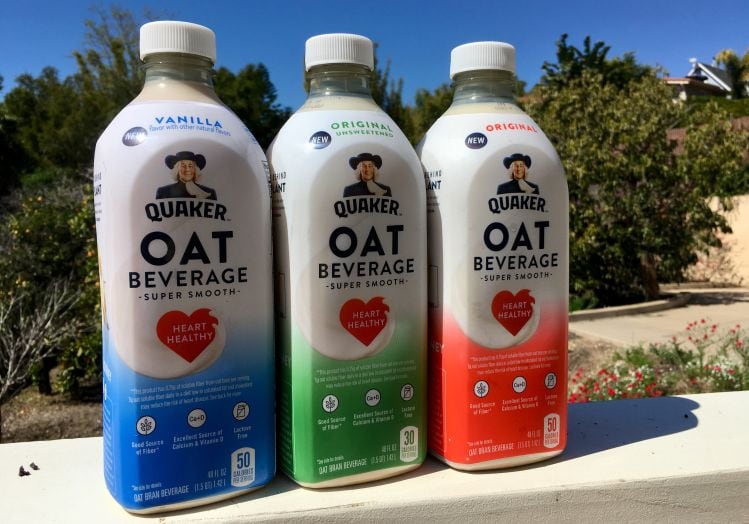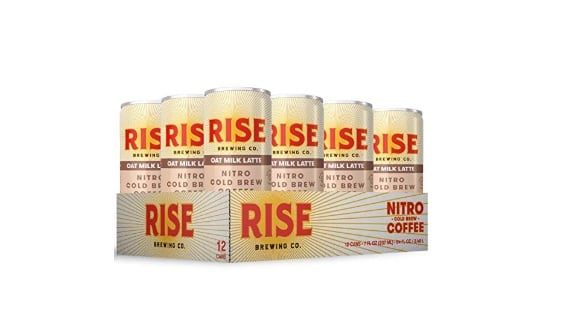In a complaint to ad watchdog NAD,* Campbell Soup (which sells oatmilk via its Pacific Foods subsidiary) took issue with Oatly’s ‘no added sugars’ claims.
While Oatly does not add sugars or other sweeteners to its oat beverages (except its chocolate version), the enzymatic process it uses to create its base oatmilk (water + oats) effectively “creates sugars in situ” by breaking down oat starch into simple sugars, argued Campbell Soup, which claims the ‘0g added sugars’ claim on Oatly’s Nutrition Facts Panel - which it has referenced in some ads – is therefore misleading.
Why do some unsweetened oatmilks contain more sugar than others?
Most unsweetened (no added sugar) oatmilks contain less sugar than dairy milk, which has 13g of naturally occurring sugar per 240ml serving.
However, eagle-eyed shoppers will observe that some unsweetened oatmilk brands with ‘no added sugar’ contain up to 7g of total sugar per serving (eg. Oatly Original has 7g, Happy Planet Original has 5g, Silk Oat Yeah and Planet Oat have 4g, and Califia Farms’ unsweetened oatmilk has 2g), while others (Quaker Oat Beverage unsweetened) contain 0g sugar.
Some may use more oats than others, but the discrepancies are mainly due to the way the oats are processed.
Oatly for example, treats its oat and water base with enzymes that break oat starch down into simpler sugars, primarily maltose and glucose. It then filters out some of the insoluble fiber and protein via a centrifuge to make a smoother, sweeter base for its oatmilk, which contains 2g fiber and 3g protein. Each serving contains 120 calories.
Quaker Oat Beverage, by contrast, uses oat bran concentrate as the primary ingredient in its unsweetened oatmilk, which contains 4g fiber (twice as much as Oatly) but less than 1g of protein, and just 50 calories per serving.
Pacific Foods makes its oatmilk without adding cane sugar, but sells a product which nevertheless contains 17g sugars per serving, "which are derived naturally from the oats and the process of making the beverage – complex carbs breaking down to simple carbs (aka sugars)," said a spokeswoman.
"All oats in an oat beverage are processed, therefore all the naturally occurring sugars in the final product are considered “added sugars” according to the new guidelines."
Asked why Pacific Foods' oatmilk has 17g naturally occurring sugar from oats, vs 7g from Oatly, she said: "You asked if it was that we use more oats. It’s difficult to say as we don’t have access to others’ formulas. It’s more likely that what gives our oat beverage its unique sweetness is that we use a longer cook time to pull the sugar inherently from the oats."
Dream Oat Beverage original - which also does not contain sugars in its ingredients list (OAT BASE (WATER, OATS), SAFFLOWER OIL, CALCIUM CARBONATE, SEA SALT, VITAMIN D2, VITAMIN A PALMITATE, VITAMIN B12, TRICALCIUM PHOSPHATE), lists all 11g of sugar in the product as 'added sugars,' again, presumably because of the way it handles the oats used in its oat base.
NAD: Oatly should not repost 0g added sugars line from NF panel in ads
Without taking a position on whether Oatly’s Nutrition Facts Panels are in compliance with FDA regulations on added sugars, NAD recommended that Oatly not re-post or restate the ‘added sugars’ line of the Nutrition Facts Panel in its advertising, but noted that nothing in its decision prevents Oatly from using the ‘added sugars’ line of the Nutrition Facts Panel “in a context that is not advertising, such as on product packaging for the purpose of complying with FDA regulation.”

UPDATE from FDA JULY 3: If sugars are created through controlled hydrolysis, they should be declared as added sugars on the label
An FDA spokeswoman told us: In our Nutrition Facts Label Q&A guidance issued in November 2018, we addressed sugars created through processes such as hydrolysis: “When an ingredient containing mono- and disaccharides that are created through controlled hydrolysis (e.g. maltodextrin or corn syrup) is added to a food during processing, those mono- and disaccharides contributed by the ingredient need to be declared as added sugars on the label (21 CFR 101.9(c)(9)(iii).”
"This guidance applies to all sugars created through controlled hydrolysis. Therefore, if all of the sugars in a product [eg. oatmilk] are created through controlled hydrolysis, our current thinking is that all of those sugars should be declared as added sugars on the label."
Oatly: ‘We’re pretty open about our production process’
Oatly is not commenting beyond what was said in the NAD announcement, but according to NAD, the company “supports the self-regulatory process and agrees to comply with NAD’s recommendations,” and “is continuing to seek greater regulatory clarity regarding hydrolysis-related sugars.”
Speaking to FoodNavigator-USA in a recent interview, a spokeswoman noted that: “We’re pretty open about our own process.
“During our process, we do break down some of the oat starch into smaller sugars and we do filter out much of the insoluble fiber (found in places like the oat bran), but we’re also able to hold onto the soluble fiber (the beta glucans).”
*The National Advertising Division (NAD) of the Council of Better Business Bureaus is an investigative unit of the advertising industry’s system of self-regulation.
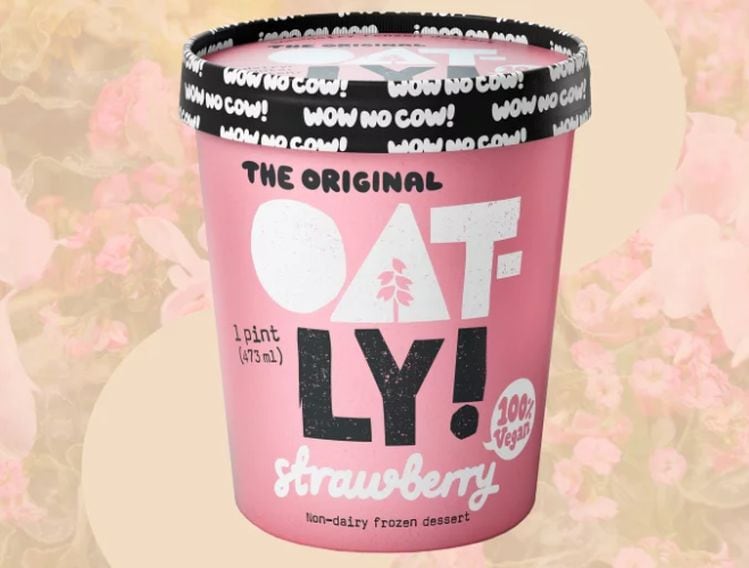
Oatly, which has just introduced an oat-based non-dairy frozen dessert to the US market (click HERE) is “in the final stages of construction of our Millville factory in New Jersey."
Another new production plant will open in Ogden, Utah, next year, a spokesperson told us in late April: “Through our partnership with the state, this factory will help us keep expand our oat milk production to bring it to all the many coffee shops, grocery stores, and refrigerators that want it.
“We’re currently in more than 2,500 coffee shops and more than 1,500 retailers nationwide. Once the Millville factory comes completely online, our first priority is ensuring that we're serving the needs of all of our current customers and those who’ve carried us in the past, but have been patiently waiting for more product. After that, we’ll look to expand.”

